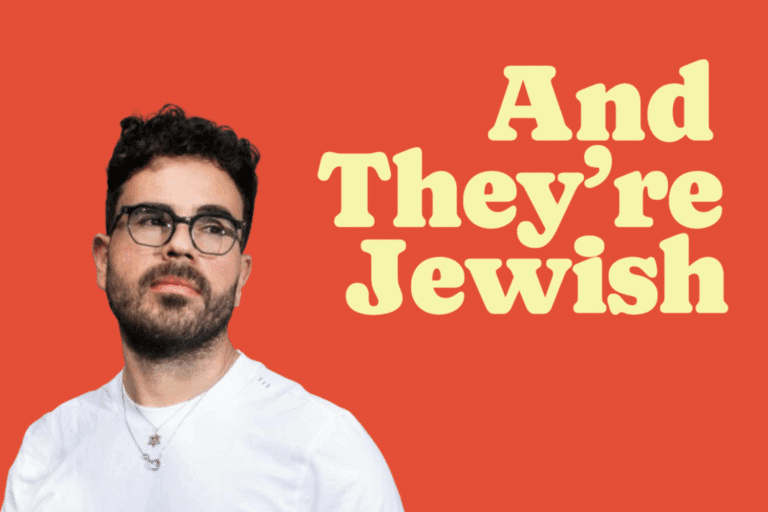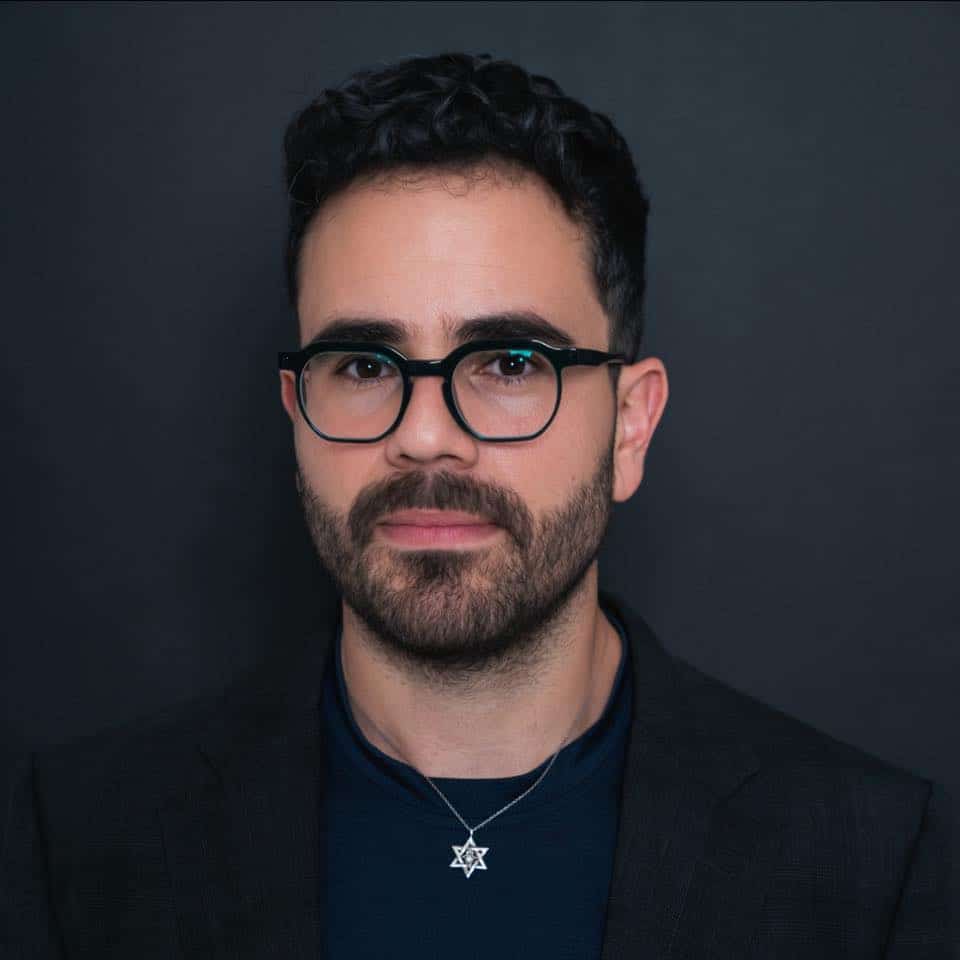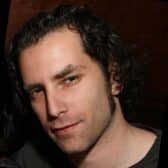
Hen Mazzig has never been shy about speaking up.
The influencer and author’s sharp, unapologetic posts defending Israel and calling out antisemitism reach hundreds of thousands daily — 395,000 on Instagram, 272,000 on X.
But even with that reach, Mazzig wanted to create something deeper: a space for relaxed, revealing conversations with Jewish celebrities who embrace their identity without hesitation. The result is “And They’re Jewish” — a warm, engaging show that’s as entertaining as it is affirming.
“A lot of Jews have felt that everything relating to Jewish identity is tied into trauma, October 7, the hostages, and there’s been a lack of content that is uplifting Jews and promoting Jewish joy,” Mazzig told Unpacked. “This is not a show just about being Jewish. It’s about being brilliant, being incredible, and also being Jewish… I wanted to create a space where Jewish joy takes center stage, where we can celebrate who we are, not just what we survived.”
Part talk show, part cultural celebration, “And They’re Jewish” is Mazzig’s invitation to pull up a chair and join the conversation. Each episode pairs him with a well-known Jewish figure — from actors and artists to activists — for an unscripted chat about identity, pride, and life beyond the headlines.
The format is deliberately casual: filmed over coffee or in cozy studio settings, the show feels more like catching up with a friend than watching an interview. Guests share personal stories about growing up Jewish, navigating Hollywood or the art world, and finding joy and meaning in their heritage.
While antisemitism and current events are never off the table, the emphasis is on showing the many dimensions of Jewish life — highlighting not just trauma, but also resilience, humor, creativity, and community.
Bialik breaks it down
Mazzig’s guests range from rising Gen Z creators to household names, but one of his most high-profile conversations was with Mayim Bialik.
Beloved by audiences since her breakout role in NBC’s “Blossom,” Bialik went on to earn a PhD in neuroscience before returning to television as Amy Farrah Fowler on “The Big Bang Theory.” Off-screen, she has long been open about her Jewish identity — from teaching Hebrew to traveling frequently to Israel — and, as she told Mazzig, she’s paid a price for that openness.
“It feels like the security I raised my children with was shattered,” Bialik told Mazzig. “And for some time, I felt, like, ‘Am I just being paranoid?’ But then October 8 happened. And that was the end of my paranoia. Because to see the vociferous and enthusiastic celebration of a massacre by so many and the simultaneous silence…that noise and that silence to me indicated something very different is happening, and I think we’re in a different era of Jewish identity…I know of no other country where if you don’t like what’s happening there, you ask for it to be destroyed.”
Bialik also took aim at how the media frames the conversation, saying it often presents a false choice between supporting peace and supporting Israel. She said she was stunned by the number of protesters who, in her view, couldn’t articulate basic facts about the conflict or its history.
“Never in my wildest nightmares would I imagine so many useful idiots marching without even knowing what they’re marching for, calling for the destruction of a people and hiding under free speech,” she told Mazzig.
Bialik’s conversation was deeply personal — but Mazzig’s very first episode set the tone for the entire series with another powerhouse guest: Emmy Award–winning actress Debra Messing.
Don’t mess with Messing
Best known as Grace Adler on NBC’s groundbreaking sitcom “Will & Grace,” Messing earned the 2003 Emmy for Best Actress in a Comedy and became a cultural icon. Mazzig noted that many young Jews have discovered the show in recent years after being inspired by her outspoken advocacy for Israel.
When he asked what advice she had for younger Jews, her response was pure admiration.
“I feel like Gen Z needs nothing from me,” Messing told Mazzig. “They are the strongest, the most proud, the most ferocious, the most determined generation yet of Jews. I just say, ‘stay the course.’”
Messing emphasized that caring deeply about Palestinians and grieving the loss of life can — and must — coexist with rejecting calls for Israel’s destruction.
Growing up as one of the few Jewish kids in Rhode Island, she admitted she once tried to hide her identity, even spending two hours a day straightening her hair. But today, she embraces it fully — not just as an actress but as a producer and advocate. She served as an executive producer on “October 8,” a film exploring the global rise in antisemitism after the Hamas attack, and she’ll soon star alongside Robert De Niro in “The Alto Knights” as Bobbie Costello, the only Jewish woman to marry an Italian mafia boss.
Messing’s career has been marked by boundary-breaking roles. As Grace Adler, she played one of the few explicitly Jewish women in prime-time television. Alongside Eric McCormack’s gay attorney Will, the series ran for 11 seasons and was widely credited with challenging homophobia on screen.
Making powerful Jewish art
From Pain to Power: Zoë Buckman’s Art Will Leave You Speechless
The series’ second episode took a more intimate turn with London-born artist Zoë Buckman.
Buckman’s work often blends Jewish ritual objects with unexpected materials — like a sculpture pairing a tallit (Jewish prayer shawl) with a boxing glove. She told Mazzig the idea came from her childhood: sitting in synagogue, jealous that her brothers received tallitot and yarmulkes while she, as a girl, got nothing.
Today, Buckman is preparing for her own bat mitzvah. In one of the episode’s most touching moments, she recited the opening lines of her Torah portion from memory as Mazzig joined in, their voices mingling across the table.
She spoke candidly about her personal and professional life — remaining friends with her ex-husband, Jewish “Friends” star David Schwimmer, and finding inspiration in the resilience of a Holocaust survivor she met in Israel. Buckman explained that Jewish themes had been woven into her art long before October 7.
But speaking out about antisemitism has come at a cost. Three of her closest friends in London unfollowed her and cut off contact after she posted, “Murdering Jewish people is not fighting for human rights.” One of her exhibitions in London was even postponed until, as she was told, the city was “less antisemitic.”
Creating the next generation of Jewish activists
In addition to hosting And They’re Jewish, Mazzig recently co-hosted the Anti-Defamation League’s annual conference alongside Montana Tucker. His message to viewers and fellow Jews is clear: activism doesn’t have to look the same for everyone.
“I am a firm believer in catering to people by meeting them where they’re at,” Mazzig told Unpacked. “Anybody can share something from my social media page or someone else’s. They should find whatever speaks to them and matches what they feel. They shouldn’t feel obligated to post only activism against antisemitism or activism for Israel. I’m tired of Jewish identity being reduced to conflict. This show is about culture, creativity, community — and I think people want this.”

For Mazzig, And They’re Jewish isn’t just a series of celebrity interviews. It’s a celebration of Jewish life in all its forms, a reminder that identity is not defined solely by struggle, and a space for pride that’s unfiltered and unapologetic.
That philosophy runs through all of Mazzig’s work, including his 2022 book “The Wrong Kind of Jew: A Mizrachi Manifesto.” In it, he shares his family’s roots in Tunisia and Iraq, exploring his Mizrachi identity; the term referring to Jews from North Africa and the Middle East. He writes candidly about the biases he has faced both outside and within the Jewish community — from extra scrutiny at airport security because of his last name, to threats from neo-Nazis, to discrimination from fellow Jews over his race and sexuality.
“I’m not the kind of Jew who keeps our dirty laundry off the clothesline,” he writes. “But I’m certainly not the kind of Jew who wants to hang our people out to dry.”
For Mazzig, love of Judaism and Israel is inseparable from the drive to educate others. He knows he can’t change every mind, but hopes that by offering a different perspective, readers will take a closer look at the narratives they believe, and at the facts themselves.
The importance of showing positivity
While Mazzig is no stranger to debate, both online and in person, the senior fellow at the Tel Aviv Institute believes that Israel and Jews must also radiate optimism.
“I think there is so much trauma and pain, rightfully so, as there are still hostages in Gaza and antisemitism is at an all-time high,” Mazzig told Unpacked. “The automatic reaction is we need to tell the world what happened to us. A lot of my work was meant to give Jewish people a voice. We’ve centered around this, but we can’t tie Jewish identity only to trauma and pain. We’re not just pain. I think the most beautiful part of our history is our resilience.”
That balance — lightheartedness alongside serious conversation — is at the core of “And They’re Jewish.” The series proves that Jewish stories can be joyful, creative, and proud without ignoring difficult realities.
Mazzig rejects the idea that Jews can’t “win” the PR battle or that an individual can’t make a difference simply because they are outnumbered.
“We are outnumbered but we are still resilient, and we are strong,” he said. “If Jewish people are afraid that we are outnumbered, they need to go back to Jewish history because we were always outnumbered and we always overcame, and I am sure we will overcome again.”
Originally Published Aug 13, 2025 03:59PM EDT
